SUMMARY
This is AI generated summarization, which may have errors. For context, always refer to the full article.
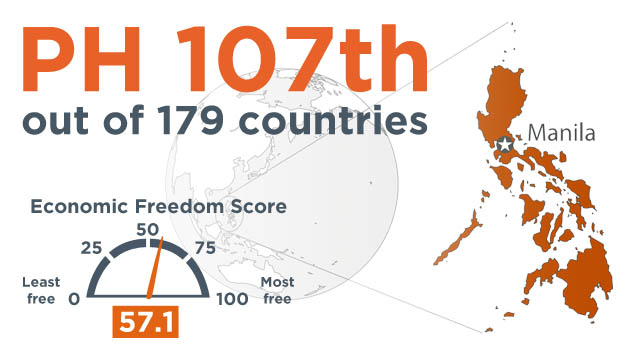
MANILA, Philippines – The country’s weak judiciary and prevalence of corruption are among the main reasons why the Philippines is still among the ‘mostly unfree’ economies in the world.
In the 2012 Index of Economic Freedom report released by the Washington-based Heritage Foundation Inc., the Philippines was the 107th freest economy in the world with a score of 57.1, inching up only 0.9 point from 2011.
The Heritage Foundation explained that economic freedom is the right of people to control their own labor and property. Economically free societies also allow labor, capital and goods to move freely.
“There are lingering institutional challenges that will require deeper commitment to reform. Despite some progress, corruption continues to undermine prospects for long-term economic development. The inefficient judiciary, which remains susceptible to political interference, does not provide effective protection for property rights or strong and transparent enforcement of the law,” the report stated.
How the country performed
The Philippines was the third lowest in rank among its ASEAN peers. The country’s performance in economic freedom in the ASEAN was eclipsed by Singapore which ranked 2nd worldwide; Malaysia, 53rd; Thailand, 60th; and Cambodia, 102nd.
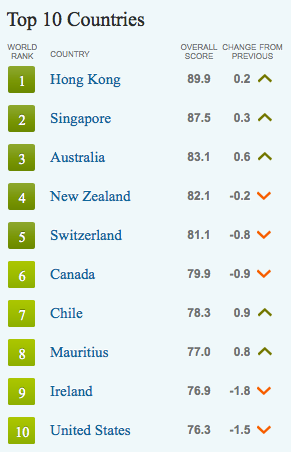
The Heritage Foundation also said the Philippines’s overall score is slightly below the world and regional averages.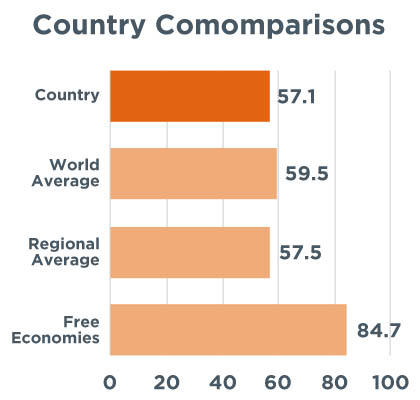
The report measures a country’s economic freedom based on 10 components from a scale of 0 to 100, where 100 represents the maximum freedom.
Problem areas
The Heritage Foundation said the Philippines continues to struggle with the rule of law, efforts to attain fiscal freedom, and opening markets.
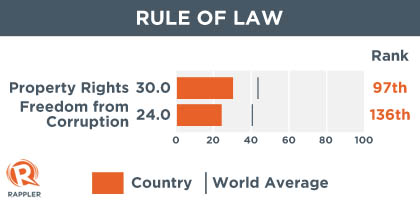
One of the 10 pillars — Rule of Law — represents how countries fare in terms of property rights and its freedom from corruption;
The report said the rule of law in the country remains uneven and the judiciary, while deemed independent, was susceptible to politics. It added that the government’s efforts to curb corruption were “inconsistent to eradicate bribery and graft effectively.”
In the recent Social Weather Stations (SWS) 2012 Survey of Enterprises on Corruption, data showed fewer businessmen deemed the government corrupt. Businessmen who found ‘a lot of corruption’ dropped to 42% in 2012 from 64% in 2009.
“The rule of law remains uneven, and the legal framework is deficient in independence and efficiency. The cumbersome court system and loose regard for contracts continue to be causes for concern. The judiciary is nominally independent but susceptible to political interference. Despite some progress, government anti-corruption efforts have been too inconsistent to eradicate bribery and graft effectively,” the report stated.
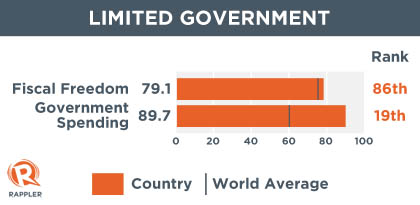
“Limited Government” gauges fiscal freedom and how government spends its resources
The report stated that the country continues to struggle with an overall tax burden that amounts to 12.8% of total domestic income. The report added that government spending has been equivalent to only 18.5% of Gross Domestic Product (GDP).
It aded that attaining fiscal freedom in the Philippines is difficult because the deficit has been over 3% of GDP and public debt is around 45% of total domestic output.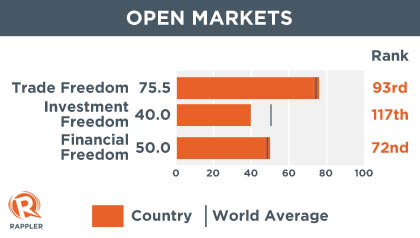
Another pillar, “Open Markets,” gauges a countries trade freedom, investment freedom, financial freedom.
A trade weighted average tariff rate of 4.8% and layers of non-tariff barriers have prevented the country from opening its markets, the report said.
These tariff and non-tariff barriers inhibit the growth in trade and limits the country’s investment prospects. What is working in this area is that the financial sector has been relatively stable and sound.
“Despite a strong desire to attract longer-term foreign investment, systemic inefficiency exacerbated by heavy bureaucracy discourages dynamic growth in investment,” the report stated.
What works
But all is not lost for the Philippines. The Heritage Foundation said efforts to improve the business environment has become less costly and the time used to deal with licensing requirement have also been reduced. 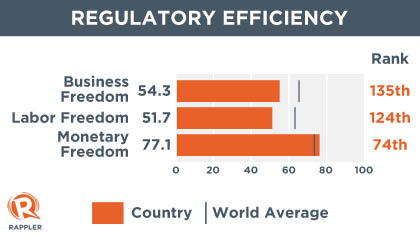
Another gauge, “Regulatory Efficiency,” measures business freedom, labor freedom, monetary freedom.
Doing business in the Philippines has improved also because of labor regulations that are not “particularly burdensome.” The benign inflation environment being enjoyed by the country in the past two years has helped improve investor confidence.
The report also noted that the government has also pursued legislative reforms to help strengthen the private sector that will help achieve inclusive economic growth.
“Despite the challenging global economic environment, the Philippine economy has been on a steady path of economic expansion. Overall progress has been gradual, but regulatory efficiency has been notably enhanced. The economy has expanded at an average annual rate of close to 5% over the past 5 years,” the report stated. – Rappler.com
Add a comment
How does this make you feel?
There are no comments yet. Add your comment to start the conversation.